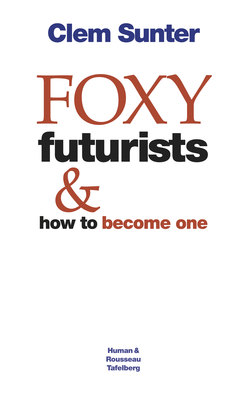Читать книгу Foxy Futurists and how to become one - Clem Sunter - Страница 11
На сайте Литреса книга снята с продажи.
Beyond reasonable greed
Оглавление| As a foxy futurist, one of the other talents you have to possess is the ability to define the rules of the game that are valid, no matter which scenario materialises. For example, in our aforementioned matrix for South Africa we rule out a scenario of being competitive and having a civil war at the same time. It is as impossible as an apple defying the law of gravity and floating up from the ground to re-attach itself to the tree. The great thing about rules of the game is that by crossing out the scenarios that flout them, you end up with fewer scenarios. In our terminology, you narrow down the cone of uncertainty by excluding a whole range of possible futures. In this case, there can be no sustainable economic recovery as long as bankers and others go beyond reasonable greed. The phrase is chosen because greed and fear are part of the human DNA. It is how we balance them with love and generosity that counts. Given the way the bankers are leaping to the defence of paying astronomical bonuses again, I am reminded of a refrain in a 1960s folk song: “When will they ever learn?” |
In 2002, I co-authored a book with Wayne Visser entitled Beyond Reasonable Greed: Why Sustainable Business is a Much Better Idea. Wayne, at the time, was Director of Sustainability Services at KPMG in South Africa. He now lives in Cambridge, England, where he has made a name in the corporate social responsibility field.
“Greed is good.” Remember the phrase immortalised by Michael Douglas, who played Gordon Gekko in the 1987 movie Wall Street? Well, Wayne and I argued that the world has more than lived up to these words by pursuing the principle that excessive greed is even better. This is what we said in the book:
“Each day, the turnover in the world’s financial markets is now in excess of $1.5 trillion. It is at least twenty times more than it was in 1980. The explosive growth of this global casino is largely as a result of introducing two new games: futures and derivatives trading. It all began on the Philadelphia Stock Exchange in 1971 and has escalated to a level where only around 2% of capital outflows are backed by trade in real goods.
“One of the worrying side effects of speculative trading is an increase in the volatility and instability of financial markets. In turn, by making real economies more unpredictable, these roller-coaster fluctuations destroy the livelihoods of small traders and farmers, increase business bankruptcies and disrupt the plans of supposedly sovereign governments to provide a better life for all.”
Five years after we wrote these words, the Crash began in the middle of 2007. The derivatives market peaked at $532 trillion, but nobody can put a value on it today. Its fall has led to the biggest decline in the global economy since the 1930s and the biggest bailout of banks ever seen. Even we are gobsmacked by the magnitude of the disaster.
We argued at the time that companies had to move away from the predatory tooth-and-claw logic of the lion to the more caring, holistic philosophy of the elephant. We called the process ‘shapeshifting’, since it involves a shift in the basic paradigm underlying all large-scale commercial activity. In particular, we needed to strive for a proper balance between cooperation and competition, and a continuing diversity of business species, large and small, strong and weak.
Moreover, we urged readers of our book to beware of ‘leophants’ who “want to be all things to all people – sucking up to shareholders when it suits them and rolling over for the ‘greenies’ when circumstances demand. They have recognised that some of their lion traits are going to get them into trouble sooner or later, and that elephants are beginning to gain favour in the world.
“As a result, they are just starting to test the water – introducing an environmental policy here, adopting a corporate governance code there, adding a few nonfinancial performance measures, setting up community forums. They are not yet bold enough to whip off their lion suits and dive right into the refreshing pool of sustainability. After all, there may be sharp objects lurking beneath the surface; besides other lions might laugh if they discover that their roar is bigger than their . . . well, you know!”
It was a genuine change of heart that Wayne and I were calling for – a revolution of the corporate mind. Keep your trunks crossed because maybe the Crash will turn out to be the most effective shapeshifter we’ve had in a long time. The only difference between a plundering dictator and a plundering director is technique. Both have to go.
Welcome to the world of the elephant where natural self-interest never spills over into unreasonable greed.
